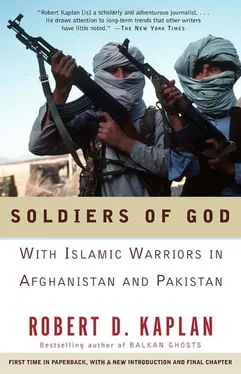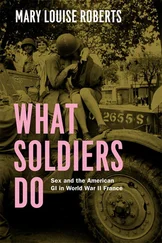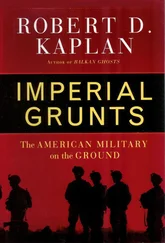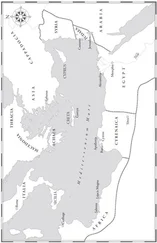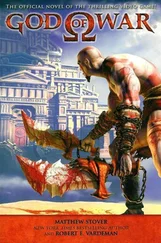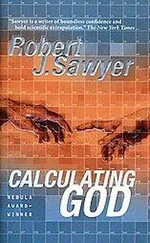I ate boiled eggs while the shells rained down on us.
“That last one was only one hundred yards away,” said Mohammed Akbar, my interpreter from Quetta.
“One hundred yards is closer than you think,” I said. “If that shell landed only a hundred yards away it would sound a lot worse.”
The ground shook and dust flew into my tea. The noise was a long, condensed burst in my ears, as if the air was being sucked out of the tent.
“That” I said, trembling, “was a hundred yards away.”
Ismael sat, relaxed and impassive. “This is what it’s like here every day.” He smiled, cleaning his plate greedily with his fork. We later discovered that a farmer plowing in the next field had been killed, and the mud-walled latrine I had used a few moments before had been riddled with shell fire.
In the midst of the mortar barrage, Haji Latif arrived. An impish grin was stamped on his leathery face as he hugged and kissed each one of us in turn, his black eyes full of laughter. He had a white beard and wore a black Kandahari turban with thin white stripes wrapped around his head, the ends falling to the middle of his thigh. The only “Gucci” touch was his black sneakers. But even those were 1950s playground style, and the white laces were untied.
With his smooth features and an assault rifle slung over his shoulder, Haji Latif didn’t look like the eighty-three-year-old he claimed to be. Nor, with his squeaky voice and effeminate lisp, did he live up to his sinister reputation as a convicted murderer and gang leader before the war. Whenever he looked at me with his mouth hanging open, I thought he was going to start to drool.
I never heard the name Haji Latif uttered. Everyone called him Haji Babà as a sign of loving respect for his age.
“Are you really eighty-three, Haji Babà?” I asked.
“I was already a young man when King Amanullah went on his European tour, and I remember as if it were yesterday when Amanullah tried to fight his way back to Kabul from Kandahar. When Zahir Shah became king [in 1933] I was twenty-eight. All my friends have collapsed and died. With the help of God I am still strong and can fight Russians.”
Haji Babà inspected the caged yellow canary and the patch of purple petunias that Ismael’s men carefully looked after… this was as mortar shells continued to fall close by. Between the deep thuds of the shells came the high-pitched sound of the songbird, bringing a broad smile to Haji Baba’s face.
“All the mujahidin in Kandahar have these birds,” Akbar noted. “The sound they make is like poetry.”
Having placed a few petunia seeds in his pocket, and satisfying himself that the bird and the flowers were being well cared for, Haji Babà reclined on a pillow and rush mat under a mulberry tree, pulled his knees up to his chin in a fetal position, and quickly fell asleep.
“Haji Babà doesn’t sleep much at night, and because of his age he must take many naps,” said Akbar.
The mortar attack continued unabated.
“Come here, listen to this,” Ismael said.
He handed me the earphones of a captured Russian transmitter hooked up to an old Chinese generator operated by foot pedals. I heard two people talking to each other loudly in Russian for several minutes. According to the Soviets, and also to the U.S. State Department, there were no Russians left in the Kandahar area in October 1988, when I visited. Officially, the remaining Soviet troops had withdrawn with much fanfare and international media coverage a few weeks before. (Russians leaving Afghanistan seemed to be an easier and more interesting story for American editors to handle than Russians fighting in Afghanistan.) But these voices were proof that there were at least a handful of Soviet advisers left behind to help Afghan regime troops, and they were partial proof of the claim made by NIFA, the fundamentalist parties, and the journalist Zia Mojadidi in Quetta that at least five hundred crack Soviet soldiers had recently returned to Kandahar.
There was nothing surprising about this. Nor was it, technically speaking, a violation of the Geneva accords governing Soviet disengagement; provided half their troops were out of Afghanistan by August 15, 1988, and the remainder by February 15, 1989, the Soviets could move troops in and out of cities as they chose. What bothered me about their presence was that either the State Department was lying about it for its own convoluted reasons or that U.S. intelligence was faulty.
When I returned to Pakistan I learned that the State Department’s belief that the Soviets were out of Kandahar was based primarily on “satellite imaging”… a series of photographs from space that would show any unusual amount of air traffic in a given area. In fact, this technique was not foolproof, since several hundred troops could have filtered back into Kandahar over a period of days or weeks without satellite detection.
More troubling still was this: several times in Arghandab, and in Panjwai (another mujahidin stronghold southwest of Kandahar), I heard the horrific, piercing sound of Ismael’s antiaircraft gun. The gunner fired only when a plane was in the air, and that was several times a day at least. The aircraft I saw… Antonov helicopters and various kinds of Soviet fighter jets… were usually ascending or descending in the vicinity of Kandahar airport, and none that I saw were hit. But later, in Pakistan, I learned that American intelligence had reported that heavy mujahidin pressure had deterred all enemy aircraft from landing or taking off from Kandahar airport during the entire period of my visit. This was untrue. When I asked whom the Americans were relying on for their information, I was stunned to learn it was their liaison in ISI, Pakistan’s intelligence service.
ISI had developed a pattern of exaggerating the successes of the mujahidin who were deep inside. The reason was to justify Zia’s strategy of arming his Peshawar pet, Hekmatyar, to the detriment of the other six resistance groups. ISI’s motive was particularly strong. When it began to look as if Kandahar might fall to the guerrillas, ISI got nervous. Kandahar’s conquest would strengthen the hand of royalist forces such as NIFA’s, because it was in Kandahar that King Zahir Shah enjoyed his strongest support. ISI, intent on creating a fundamentalist Afghanistan in Zia’s image, wanted Kandahar to fall only if the credit and spoils could go to commanders like Hek-matyar and Rasul Sayyaf (the leader of another fundamentalist mujahidin party that, like Hekmatyar’s, depended on outside support and was thus easily manipulated by ISI).
So, a few weeks before I visited Kandahar, ISI had sponsored Hekmatyar on a tour through the region, providing him with a Pakistani army escort right up to the Afghan border. Following the tour, which both NIFA and Khalis’s Hizb-i-Islami condemned, ISI began delivering Stingers and radar-guided mortars to whatever forces in Kandahar Hekmatyar could muster, as well as to Sayyaf’s mujahidin, who were considerably stronger in Kandahar than Hekmatyar’s fighters. In order to get the Americans to turn a blind eye to this risky policy, ISI had to show results in the field, such as claiming that Kandahar airport was under control.
The awful truth seemed to be that the only sources of information the United States had about the fighting in Kandahar, and anywhere else in Afghanistan during the later stage of the war, were their own satellite photographs and what ISI chose to tell them. (Before the mujahidin cut the road links between the major cities, officials at the American consulate in Kabul were at least able to debrief visa applicants who had recently traveled to the capital from Kandahar and Herat. And for much of the war, the American embassy in Islamabad had a cordial relationship with Peshawar-based journalists who frequently went inside and, in the time-honored tradition of foreign correspondents, subsequently swapped information with diplomats. But by the late 1980s, the diplomats had decided that the “Peshawar gang” were a bunch of loonies who lacked any credibility.)
Читать дальше
